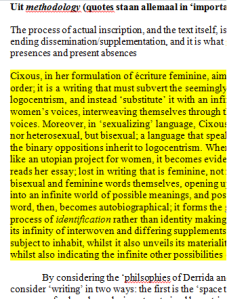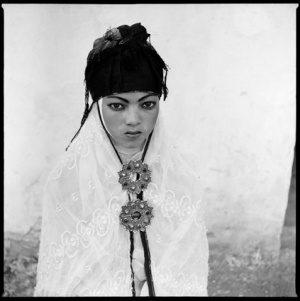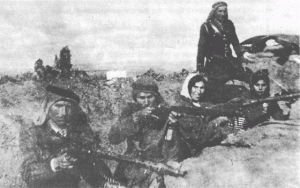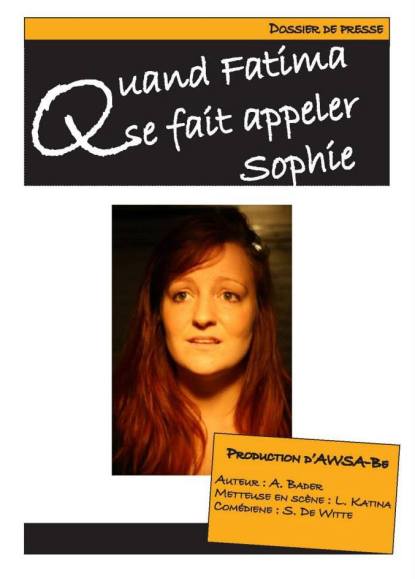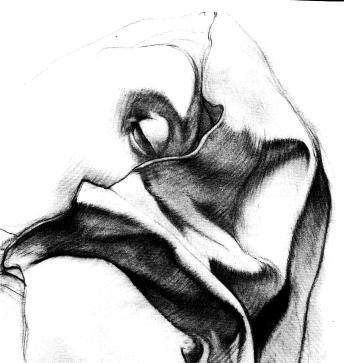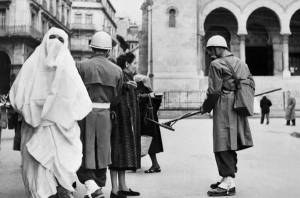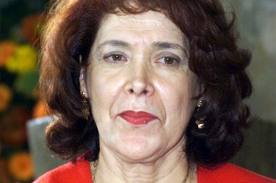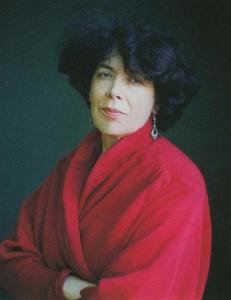
Since I have been very busy these last few days, I have not been able to produce anything new for this blog. Yet since even I got a bit tired of looking at the same blogpost for over a week now, I decided to ‘reproduce’ an essay that I wrote for a course last semester called ‘Literature Across Cultures’, taught by dr Birgit Kaiser. Yes, an extremely lazy move, but on the other hand this essay relates so well to this topic that I feel that it is a move that I, in all my supposed laziness, must make. Now sit back, relax, pour yourself a cup of coffee and be ready to be drawn into an Opera composed and sung by my three hero(ine)s: Djebar, Cixous and Derrida
A Polyphony of Singular Voices: On Djebar, Cixous and Derrida
loaded words defused themselves as soon as uttered, that by their very nature they lost their power to touch me (…). The word had simply drowned before reaching its destination…
(Djebar 1993: 126)
Ouverture
Assia Djebar’s highly poetical and thought provoking book Fantasia: An Algerian Cavalcade (1993) is one that hardly gets by unnoticed by the literary- and postcolonial scholars. Chock full of linguistic props, blurred gender binaries and colonial horrors, the book does not only make an appeal on History with a capital H, but also on the silenced, long-forgotten Algerian women. Djebar’s oeuvre is characterized by themes such as exile, otherness, femininity, identity and, last but certainly not least, the Algerian war of independence. Djebar, born in 1936 as Fatima-Zohra Imalayen in Algeria, experienced the events around the struggle for independence in Algeria from up close. The French had colonized Algeria since the 1830s. Spurred by the Front Libération National, the Algerian war of independence started in 1954 and lasted until 1962, the latter date indicating the official year that Algeria gained independence. The Algerian war of independence did not only leave its traces in the colonial history and collective memory of France and Algeria, but also in the Francophone literary- and cultural theories. Influential philosophers such as Jacques Derrida and Hélène Cixous formulated theories in which they relate the search for a singular identity to the notion of ‘the mother tongue’. Their specific relation to the French language is an ambiguous one; French is the ‘imposed’ language through the French colonial school system, but also functions as a global language of emancipation and modernity. Derrida, in his Monolingualism of the Other; Or, the Prosthesis of Origin (1998) discusses the myth of the mother tongue; one does not own a language, but rather naturally inhabits one. Cixous on the other hand focusses on the mother in mother tongue: not only is the French the colonizer’s language, ‘language’ as we know it in our daily lives is also a phallocentric language; centred around, and ‘ordered’ by, the symbol of the phallus. Cixous therefore coined the notion of ‘écriture féminine’, a language for and by women, a language that allows women to speak in a language that is not oppressive, but liberating. Écriture féminine is a means to re-inscribe and reclaim the feminine body. In this essay, I will explore the ways in which Cixous’ and Derrida’s voices resonate in Djebar’s Fantasia: An Algerian Cavalcade. By focussing on écriture féminine and Derrida’s Monolingualism of the Other, I will be able to foreground the tension between the plurality, and consequently, the tension between orality and writing in Djebar’s quest to rewrite of the histories of the Algerian women.
Azione Teatrale. Djebar’s Fantasia: An Algerian Cavalcade (1993)
Djebar’s Fantasia: An Algerian Cavalcade, which appeared originally in French as L’amour. La Fantasia (1985), is characterized by its fragmented writing style. Already at first glance, when one opens the book and peers to its table of contents, this becomes evident: all chapters are divided in chapters, which in its turn are again divided in subchapters. Especially part III of Djebar’s novel, ‘Voices from the Past’ appears to be crumbled. Each subchapter in part III is followed by another subchapter, all of them named ‘voices’, which are subsequently followed by other subchapters. Almost all of these latter subchapters are inscribed in italics: ‘clamour’, ‘murmurs’, ‘soliloquy’. Already at the very beginning of the book the reader is made aware of the multiplicity of stories included in Fantasia: An Algerian Cavalcade. In her book, Djebar combines archival historical sources with her own as well as other women’s testimonies. The first part of her book mainly consist of Djebar’s ‘own autobiography’, alternated by French historical reports of the conquest of Algeria during the late 19th century. In this way, Djebar aims to reconstruct an Algerian history by adding to it Algerian, feminine voices. Jane Hiddleston, in her chapter ‘War, memory and Postcoloniality’ (2006) states that, “[Djebar’s] narrative, carries within it hesitant traces of multiple other voices that both interrupt and structure her perception of her own, and Algeria’s past” (Hiddleston 2006: 55). These multiple voices, which both interrupt and structure Djebar’s narrative will be key in this essay. It is not only the way in which Fantasia: An Algerian Cavalcade is structured, but also Djebar’s constant reflections on, and her awareness of, this fragmented (collective) identity. Djebar, who attended both the French colonial school system in Algeria as well as the Quranic school, is in a constant struggle between her ‘paternal’ language (French) and the Arab or Berber language. Birgitte Weltman Aaron (2008) writes that
First, the language she [Djebar] uses in her writing, French, not by choice but by the necessity imposed by French colonization (“Territoires de langues,” 29), is deprived of the affect of the mother tongue, Arabic (24). At the same time, French is associated with movement and space (27), in the sense that unlike her female cousins, she did not stop attending schools when she turned eleven, and went to college in another town “with the complicity of the father” (27). This complicity functions both with and against the colonizer, a duality on which Djebar always insists. (Weltman-Aaron 2008: 143)
Djebar uses language, words and poetics to reconstruct Algerian female voices, and to bring light into their darkness. Yet the French language is the language of the colonizer. How to translate the untranslatable Algerian femininity into the language of the conqueror?
Cantralto. On Cixous, Djebar and Écriture Féminine
Writing language through the body and writing the body through language is the focal point of écriture féminine, are also key in Djebar’s Fantasia: An Algerian Cavalcade. Écriture Féminine as an actual term was first coined by Hélène Cixous in her influential essay ‘The Laugh of Medusa’ (1976). Here, Cixous argues that the symbolic order as we know it (and still use in our everyday lives) is phallocentric; it is a language that can only express itself in binaries and dichotomies. Ann Rosalind Jones, in her article ‘Writing the Body: Towards an Understanding of Écriture Féminine’ (1981), paraphrases for us the thought that supports and constitutes this phallocentric order:
“I am the unified, self-controlled centre of the universe,” man (white, European, and ruling class) has claimed. “The rest of the world, which I define as the Other, has meaning only in relation to me, as man/father, possessor of the phallus.” (Jones 1981: 248)
The notion of the phallocentric order is thus based on a language which expresses itself by ‘othering’ all that is not the self: man/woman, I/you, he/she, black/white, etc. It is a symbolic order constructed of irreconcilable divisions between the self and the other, the centre and a periphery.
Cixous, then, proposes a new symbolic ‘order’, one based on pluralities, multiplicities and differing sexualities (rather than ‘opposing’ sexes). In the phallocentric order, ‘the woman’ is always the one who is represented, not the one who represents. In the phallocentric order, she is mystified and marginalized, and cannot be the owner of this order, since a woman is not symbolized by a phallic oneness, but rather by multiplicities of sexual organs (the multiple lips of the vulva). Driven to create a new order, Cixous writes:
Woman must write her self: must write about women and bring women to writing, from which they have been driven away as violently as from their bodies-for the same reasons, by the same law, with the same fatal goal. Woman must put herself into the text-as into the world and into history-by her own movement. (Cixous 1976: 875)
If a woman wants to reclaim and free her body from a patriarchal, heteronormative and phallocentric order, she must write her-self. She must translate her body into text, and the text must become body. How abstract this notion may sound, if one actually reads Cixous’ ‘Laugh of Medusa’, one quickly understands what this écriture féminine might actually look like: fragmented, lacking punctuation; all over the place. No binaries, no structure, no beginning, no end. When one expects to read a recognizable sentence, it is soon interrupted by another, and by another, etcetera. Luce Irigaray, who is considered another founding mother of écriture féminine, performs this feminine writing just the same in her text ‘When Our Lips Speak Together’, where she states that
Your language doesn’t follow just one thread, one course, or one pattern, we are in luck. You speak from everywhere at the same time. You touch me whole at the same time. (…)“You? I? That’s still saying too much. It cuts too sharply between us: “all.” (Irigaray 1980: 74, 79).
Écriture féminine does not speak on behalf of a you and an I, nor does it grow from one root; rather aims to speak everything and everyone at once. It aims to speak from a jouissance, a space where male no dominance or phallic power exists; a place where the Law of the Father does not reign.
Écriture féminine, and consequently Cixous, constantly displaces the ‘self’. As Irigaray showed, writing écriture féminine does not aim to write with notions such as ‘you’ and ‘I’. Cixous argues that the phallocentric order is based on the notion of possession; possession of the phallus, the holder of power. Moreover, Cixous argues, women have always been ‘within’ the phallocentric discourse (a within as an illusion of ownership). Cixous argues that
If woman has always functioned “within” the discourse of man, a signifier that has always referred back to the opposite signifier which annihilates its specific energy and diminishes or stifles its very different sounds, it is time for her to dislocate this “within,” to explode it, turn it around, and seize it; to make it hers, containing it, (…) inventing for herself a language to get inside of. (Cixous 1976: 887)
Cixous argues that, if a woman has always been “within” the discourse, it is her task to constantly dislocate this ‘within’, displacing the ‘I’ with the ‘other’, and vice versa. In discussing language, or the symbolic order, as a notion that can be dislocated and displaced, Cixous emphasizes the spatiality of language, and consequently, the unsettling movement one can make through this space; it is an order through which one can move, a space in which one can explode. The ‘I’ in écriture féminine, and in Cixous’ theoretical and poetical language is, as Jane Hiddleston eloquently puts is in her book Poststructuralism and Postcoloniality (2010), an unsettling ‘I’. Hiddleston states that Cixous’ displaced sense of the ‘I’ in her writings “does not seek fusion with its image, but quite the reverse; it is continually changing and becoming, and looks perennially beyond itself” (Hiddleston 2010: 48). This constant wandering between the self and the other, this ongoing displacement, is also expressed in Fantasia: An Algerian Cavalcade. As mentioned earlier on in this essay, Djebar interweaves her autobiographical notes with those of other women and with archival historical sources. Her stories are constantly interrupted by other voices, and these voices consequently interrupt the historical accounts and Djebar’s autobiographical notes. Djebar’s narrative is one that remains fragmented and open. The ‘I’ in Fantasia: An Algerian Cavalcade is never truly at ‘home’ or at rest, neither in the (cultural) history of Algeria, nor in the French language, “a language imposed as much as by rape as by love” (Djebar 1993: 216). Djebar’s Fantasia: An Algerian Cavalcade is a book that remains open, since none of the voices are ever done speaking, or can speak without being interrupted by another voice. As the epigraph of this essay already shows, “[t]he word had simply drowned before reaching its destination” (Djebar 1993: 126), drowned in a sea of infinite voices, ready to be heard but not capable of fully expressing themselves. Later on, at the end of the book, Djebar writes:
I journey through myself at the whim of the former enemy, the enemy whose language I have stolen (…). While I thought I was undertaking a ‘journey through myself’, I find I am simply choosing another veil. While I intended every step forward to make me more clearly identifiable, I find myself progressively sucked down into the anonymity of those women of old – my ancestors! (Djebar 1993: 216-217)
Again emphasizing the travel through the spatiality that Djebar’s feminine writing allows, she also expresses an anxiety, a failure to move forward, the impossibility of moving closer to her ‘true’ identity. Djebar is being pulled down by other voices, those of her female Algerian ancestors. Cixous, according to Hiddleston, occupies this same position in her writings (and which are consequently also expressed as a creation of écriture féminine). Hiddleston argues that “Cixous stresses her attempts to remain open to the other’s difference. In writing about otherness, about other subjects writers and texts, she seeks not to possess her object of inquiry but to leave herself open to transformation by the encounter” (Hiddleston 2010: 49). Both Cixous and Djebar are displaced by their position; at the confines of language, deprived from a mother tongue, they seek to voice counter-histories and identities by encountering the other’s voice, and letting unstable and unsettling notion of ‘the self’ be transformed through this voice.
Cadenza: On Derrida and his Universal Specificity.
The terms that keep sneaking around the corner are ‘possession’, ‘mother tongue’ and ‘identity’. But how can one identify ‘the self’, if one cannot be at rest in the language in which one writes? Already on page one, Jacques Derrida, in his Monolingualism of the Other; Or, the Prosthesis of Origin (1998), states that
“I have only one language, it is not mine” (Derrida 1998: 1).
This paradox, of having something which is not one’s own, resonates through his entire book. Derrida, himself a Jewish Franco-Maghrebian, inserts his own autobiographical notes into his philosophy. In doing so, he does not only emphasize his specific situatedness, but he also makes a “move from the universal to the specific” (Hiddleston 2010: 39). The universal indicating the “alienation in language experienced by all speakers, including those who claim hegemony [i.e. the colonizer, white Western male]” (Hiddleston 2010: 39, emphasize added), and the ‘specific’ referring to Derrida’s own situatedness as being a Jewish Franco-Maghrebian. Derrida, in calling ‘himself’ and his situation in language ‘specific’, underlines the absurdity and the importance of this paradox; no one owns a language, not those who claim they do, and not those who specifically argue that they are intentionally deprived from a language. No one does.
Derrida argues that language is not natural, that it is not a given, but is rather always already owned by the other; we learn languages from the other, to whom we consequently direct the language. Through language we can encounter the other. The language we speak, therefore, is only directed to the other, others whom we encounter, yet it is not totally ‘other’ since we seek to inhabit it, and making it our own; it is the only language through which one can formulate and express oneself. Derrida calls this “alienation without alienation, (…) inalienable alienation” (Derrida 1998: 25). Meaning that one is alienated from this language because it is always the language of the other, but since this language is on the other hand is the only language one speaks and through which the self is expressed. Alienated from something that has no core, no property, no center, and therefore is unalienable. But, more importantly, Derrida argues that language was never anyone’s property; it has always been a monolingualism of the other. In claiming that one does own a pure mother tongue or language, this is merely the expression of a desire to actually obtain a natural, pure tongue; a nostalgia to return to something that never was.
Derrida then poses a question, which brings us back to Cixous and Djebar:
How can one say and how can one know, with a certainty, that one shall never inhabit the language of the other, the other language, when it is the only language one speaks (…). Invent in your language if you can or want to hear mine; invent if you can or want to give my language to be understood, as well as yours, where the event of its prosody only takes place once at home. (Derrida 1996: 57)
Why is it that only the specific (i.e. the colonized, the women, the Jewish Franco-Maghrebian) claim to be diaspora’s in language, when it is actually a shared universal ‘home’-sickness? We must face the fact that there is no pure, essential mother tongue. The (male, colonizer) West does not have a monopoly on language; no one can claim that they ‘possess’ or speak the language better than others, since no one naturally owns this language. In denying the existence of an owned mother tongue (which was supposedly owned more by some than by others), one is allowed to see expressions of language as articulations of unique, singular bodies. Indeed, Derrida argues for language as articulated by singular bodies, instead of articulated from a natural and pure ‘mother tongue’. As Birgit Kaiser argues, in her article ‘A new German, singularly Turkish. Reading Emine Sevgi Özdamar with Derrida’s Monolingualism of the Other’ (2014,) is that “Derrida affirms simultaneously that on that basis we are required to account for the fact that there are singular bodies expressing themselves in uniquely inflected tongues” (Kaiser 2014: 973). If we want to hear expressions of other singular bodies, others than ‘our own’ expressions, we must open up this one language to let in the differences, the singular articulations, and we must encounter these bodies as singular, again transforming the articulations of the self in singular, unique ways.
Trio: On Djebar, Cixous, Derrida and the Singularity of the Orality of Writing
Since Derrida, already the first page, kicks off by stating that the I has no language, the reader is suspicious of the identity of the author; how can Derrida, then, even claim that there is an ‘I’ in language? The unsettling movements of the ‘I’, then, refer to Derrida’s idea that there is no identifiable ‘I’, not in his nor in anyone’s monolingualism of the other. Rather, the ‘I’ is always in the process of becoming. Derrida argues that “an identity is never given, received or attained; only the interminable and indefinitely phantasmatic process of identification endures” (Derrida 1998: 28). The existence of an ‘I’ is not a given, but is always liable to change. It is always opened up and moved by singular articulations of the other. Derrida’s own singular articulation through his autobiography strengthens this notion of this ‘identification’; through language, one is always in the making, always narrating the self. As we have seen, both Cixous and Djebar respond to this process of identification, and the articulation of a singular body. Djebar too shifts from the specific to the universal, from the Algerian war to specific situations of women in a specific village, from the ‘I’, to the ‘We’ to the ‘Us’. Archival accounts are constantly disrupted with ‘cries’, ‘murmurs’ and ‘whispers’ by Algerian women. She moves from expressions and testimonies of women to philosophical reflections on the ontological apparatus that is language; she does not own French, yet it is the only language in which she is ‘allowed’ to articulate.
Djebar tries to articulate singularity through her autobiography and women’s testimonies. She wants to write her body and those of other women, since they have been excluded from language since forever.
To attempt an autobiography using French words alone is to lend oneself to the vivisector’s scalpel, revealing what lies behind the skin. The flesh flakes off and with it, seemingly, the last shreds of the unwritten language of my childhood. Wounds are reopened, veins weep, one’s own blood flows and that of others, which has never dried. As the words pour out, inexhaustible, maybe distorting, our ancestral night lengthens. Conceal the body and its ephemeral grace. Prohibit gestures – they are too specific. Only let sound remain. (Djebar 1993: 156)
Djebar’s attempt to write the body into language, into the French language, is a violent act. Blood, flesh, everything is torn off, only to be transcribed into words. By turning flesh into words, the childhood is abandoned; the connection with the mother, or the mother tongue, is cut off. Yet, by calling her ‘childhood language unwritten’, and by violently inscribing the body and its flesh into the colonizer’s language, Djebar foregrounds the sound that remains. Soheila Ghaussy, in her article ‘A Stepmother Tongue: “Feminine Writing” in Assia Djebar’s Fantasia: An Algerian Cavalcade’ (1994) argues that, “Linking language to the (female) body is another aspect of écriture feminine that is crucial for Djebar: Arabic, for example, is described in Fantasia as “oral”: it is open and fluid, flirtatious and sensual” (Ghaussy 1994: 460). Djebar inscribes the bodies of her long lost Algerian sisters, separating them from their childhood (language), yet it is through this process of inscribing the bodies that the orality remains. For Djebar, this orality is inherently linked to the Arabic language. Moreover, Djebar argues, this is also an orality that cannot be accessed through language. Djebar makes this more specific later in her book, where she writes that
In our towns, the first woman reality is the voice, a dart which flies off into space, an arrow which slowly falls to earth; next comes writing, with the scratching pointed quill forming amorous snares with its liana letters (…) Exposed, a woman’s body would offend every eye, be an assault on the dimmest of desires, emphasize every separation. The voice, on the other hand, acts like a perfume, a draft of fresh water for the dry throat. (Djebar 1993: 180)
In this we can trace back the movements of Djebar in the French language. It is through her very employment of the French language that she foregrounds her ‘lost’ mother tongue; the Berber/Arabic tongue. Arguably, Djebar attempts to blur the line between spoken and written language by expressing the inaccessibility of the very thing Djebar is trying to inscribe. Ghaussy rightly points out that
[i]t is precisely for this reason [the oral interweaving with the written] that in Fantasia the female body is disembodied, transformed into liquid, scent, sound, or silenced, paradoxically, in order then to speak and relate back to its own physicality. (Ghaussy 1997: 460).
This resonates with Cixous’ idea of écriture féminine, where there are no divisions, no binaries: not between speech and writing, between song and literature (Cixous 1975: 881). The binary oppositions that cause women to be separated from the men, the ‘I’ separated from the O/other, and the colonizer separated from the colonized.
Djebar’s inscription of an almost tangible tension between the oral and the written, between the Arabic/Berber and French, between the man/woman, can be said to be an articulation of her singular body. This singularity is articulated through a French that is not structured the way the colonizer would want it to. No, it is a French through which multiple (feminine) voices and languages all speak at once, voices and languages that themselves were not allowed (and consequently obscured) to speak in the French language (literally and figuratively: they were not allowed in the colonial school system, nor where they mentioned in French, historical archives). Djebar makes the French language a language of the body (see also Djebar 1993: 184), which can then speak in silence the chant-like words of love in Arabic. Hiddleston (2006) argues that “[t]he language with which she [Djebar] tries to express herself is unable to access the infinitely contingent kernel that she wants to describe” (Hiddleston 2006: 77). Indeed, whereas the French language is not capable of accessing the voices of her Algerian female comrades, it is the only language through which Djebar can express the existence of these bodies. She inhabits only one language, yet this language is not hers. One might go as far and say that Djebar stitches together a female body made out of flesh and words, only to let it sing, since one cannot sing without a tongue and vocal cords. Cixous, in ‘The Laugh of Medusa’, shows the same fascination with the writing and the song. Cixous states that “[i]n women’s speech, as in their writing, that element which never stops resonating, which, once we’ve been permeated by it, profoundly and imperceptibly touched by it, retains the power of moving us-that element is the song (Cixous 1976: 881). Women’s voices are obscured and censored by denying them a bodily presence, both through the phallocentric order as through the myth of the mother tongue (and who is ‘allowed’ to own a mother tongue).
Claque: The Last Song of the Show.
To refresh where it all started, the purpose of this essay was to set up a triangular conversation between Derrida’s Monolingualism of the Other; Or, the Prosthesis of Origin, Cixous’ écriture féminine as formulated in her text ‘The Laugh of Medusa’ and Djebar’s Fantasia: An Algerian Cavalcade. What binds these three is that all have a specific relation towards ‘the possession’ of a mother tongue. Derrida, Cixous and Djebar all have experienced the best and the worst of the French colonial school system from up close. They therefore inhabit a specific position towards the French language. Whereas Derrida and Cixous formulate the anxieties of possession and lack of a ‘mother tongue’ in a more ‘theoretical fashion’ (whereas the term ‘theoretical’ is a rather problematic one, since both Derrida as Cixous ‘practice what they preach’ in their texts), Djebar’s novel is a literary reflection on Cixous’ and Derrida’s notion of language. One of the main themes in Djebar’s Fantasia: An Algerian Cavalcade is silence; silence that is superimposed on Algerian women by both the French colonizers, as by patriarchal male oppression. In her book, Djebar aims to reconstruct these voices by voicing their testimonies, which are interlaced with both Djebar’s autobiography as French Archival sources that where produced during the French colonial presence in Algeria. Derrida, Cixous and Djebar all write their text from their specific situatedness, and interrupt their reflections on the French language with their own autobiographical notes. In doing so, they demonstrate that there is not ‘one true voice’ able to express and articulate a singular body, but rather multiple voices and articulations. In Djebar’s book, this quest for a ‘feminine, Algerian plural body’ is illustrated in a poetical, literary fashion. As Derrida called for, Djebar invented ‘her’ feminine language to hear other languages, other sounds, other songs sung by her Algerian feminine comrades, yet her own singular identity remains unstable and in-the-making. Moreover, as argued earlier in this essay, Djebar is caught in the translation of the untranslatable; the tension produced in this ‘translation’ is what articulates Djebar’s singular being. The tension between the oral and the written, between French and Berber, this tension then is the space from where Djebar articulates. Yet this articulation of Djebar’s singular body takes multiple encounters with other singular expressions of singular bodies; Djebar’s singularity is one that emerges out of a plurality.
